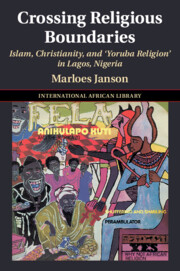‘Written from the hustle of life in Lagos where ‘everything is possible’, this evocative book opens up new possibilities for research on religion in plural settings. Grounded in a series of fantastic case studies of ‘Chrislam’ and other instances of religious mixing, Janson offers a fresh conceptual framework for studying the interactions of Christians, Muslims and traditionalists. Taking relationality as default, she proposes new inroads for our understanding of religious plurality from the angle of assemblage.’
Birgit Meyer - Utrecht University
‘A superb, well-argued, and competently anchored monograph on the ebullient religious field that is Yorubaland, Nigeria. A brilliant sequel to the author’s hugely influential first book, it will further cement her growing reputation as one of the most knowledgeable and insightful scholars of the religious economy in West Africa. Janson has a novelist’s eye for the telling anecdote, and her analysis immerses the reader in an everyday reality in which the absurd is never too far away from the profound.’
Ebenezer Obadare - University of Kansas
‘For anyone interested in the meaning, value and transformation of religion in urban centres such as Lagos in Nigeria, this is an extraordinarily important and insightful text. With considerable breadth and theoretical depth, Janson lucidly weaves together a deeply captivating range of insights of how urban religions intersect with the everyday lives and practices of people in Africa’s largest urban sprawl.’
Asonzeh Ukah - University of Cape Town
‘Rarely is an ethnography of religion as fascinating and immersive as this one … After reading this book, you will think carefully about approaching any other work that focuses on a lone faith in isolation. The interplay is all.’
Philip Jenkins
Source: The Christian Century
‘This is an important perspective and contribution. Janson presents empirical case studies that confirm the power and possibilities of this relationship, which is the essence of Janson’s book. She offers new vistas for appropriating and interrogating religious agency.’
Akintunde E. Akinade
Source: Journal of Religion in Africa



